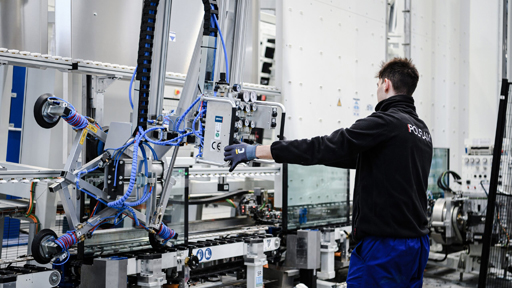A year has passed since the inauguration of Polflam’s new factory in Warsaw, Poland, which immediately became one of the most dynamic and interesting sites within the glass industry: with over 20,000 square meters of production area, it is a modern, fully automated factory dedicated to the production of fire-resistant glass. Forel played a special role, installing the 2 integrated logistics systems, the edge processing and IG assembly lines.
Since 2005, Polflam has chosen to specialise in fire-resistant Double Glazed Units, achieved by filling the cavity between the two panes of glass with a special hydrogel interlayer. The resulting fire-resistant DGUs, which must pass strict quality tests, meets integrity and full thermal insulation for Polflam EI and integrity with reduced heat radiation for Polflam EW.
In 2019, the company was acquired by the private equity group Baltisse, which enabled Polflam to expand into new regions which involved the construction of the new factory, the organisation of production flows and the installation of a complete new fleet of equipment.
“Before Baltisse Group’s investment, Polflam was still a semi-craft business, where processing was 85 percent manual,” said Jean Luis Canelle, Director. “Our goal was to transform the company, increasing productivity and sales globally especially into Western European markets. But this was not possible from the old site.”

“The production capacity of the initial factory was already at maximum,” commented David Ulens, CEO of Polflam. “We could not grow any more there. Moreover, the manual processing did not make it possible to establish standard levels of quality, cycle times, precision. We had to start from the basics and completely rework the production process.”
“Fire-resistant glass is, in many cases, simply mandatory by law” concluded David Ulens “Housing density is increasing throughout Europe: new regulations will require buildings to be fitted with fire-resistant glass. It is therefore easy to deduce that our market will continue to grow in the long term: and Polflam has equipped itself to increase its competitive edge and play a leading role.”
“The choice of machinery to be used was decisive,” continued Jean Luis Canelle. “We looked at several options, but then narrowed the field down to three main suppliers, among which Forel played a special role, installing the 2 integrated logistics systems, the edge processing and IG assembly lines. There are three reasons why we chose this brand.
“Firstly, Forel immediately understood that we were talking about a special and complex project and offer us an effective solution. The technological aspect was the second point: I think that Forel offers the best solutions, especially for the assembly of insulating glass. The third point is service, which is essential: a machine is a tool and can be the subject of negotiations, but the availability of a good service system is decisive. It is indispensable, from the installation of the machinery onwards. And with Forel, our expectations were 100 percent fulfilled.”





